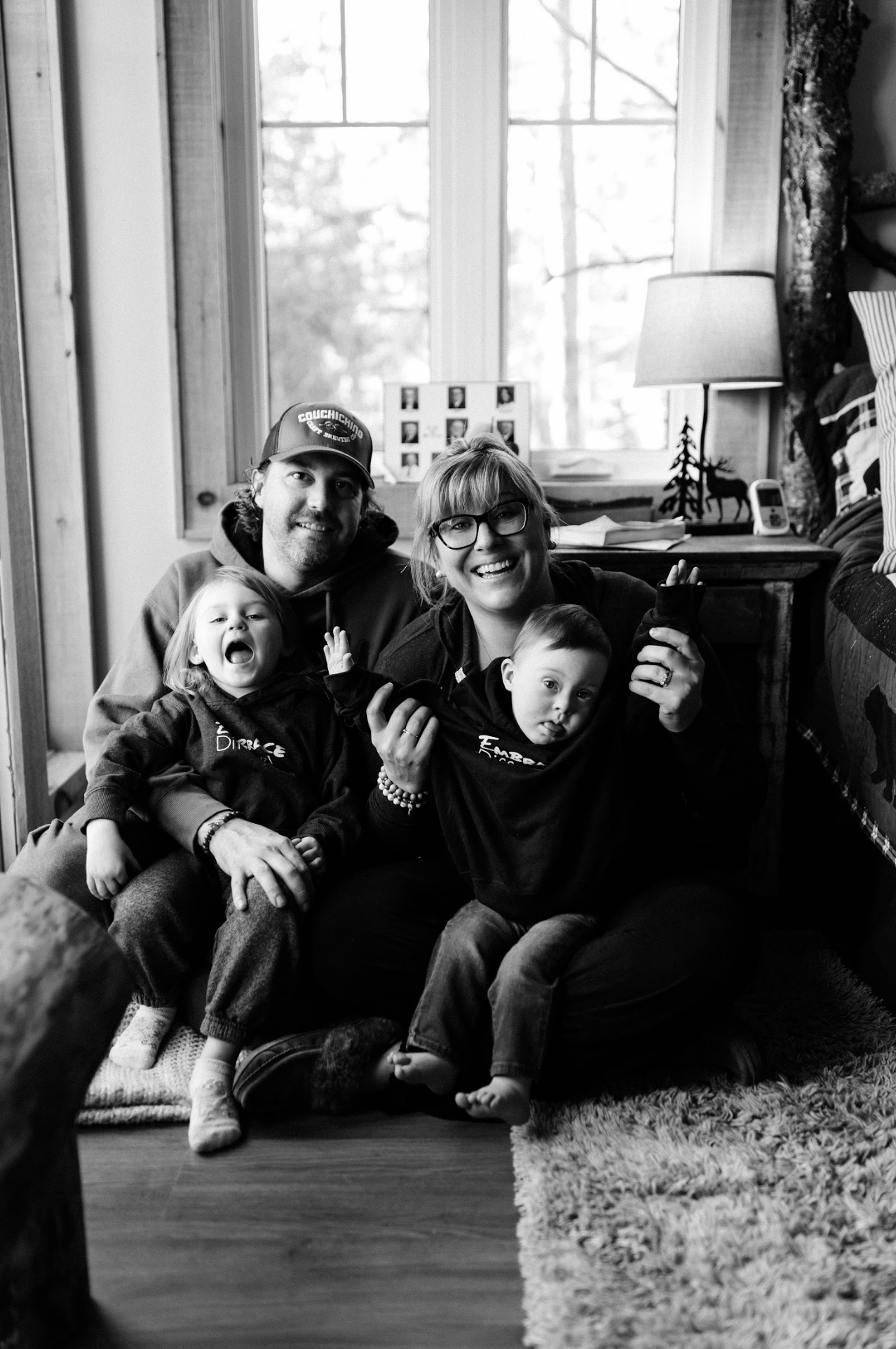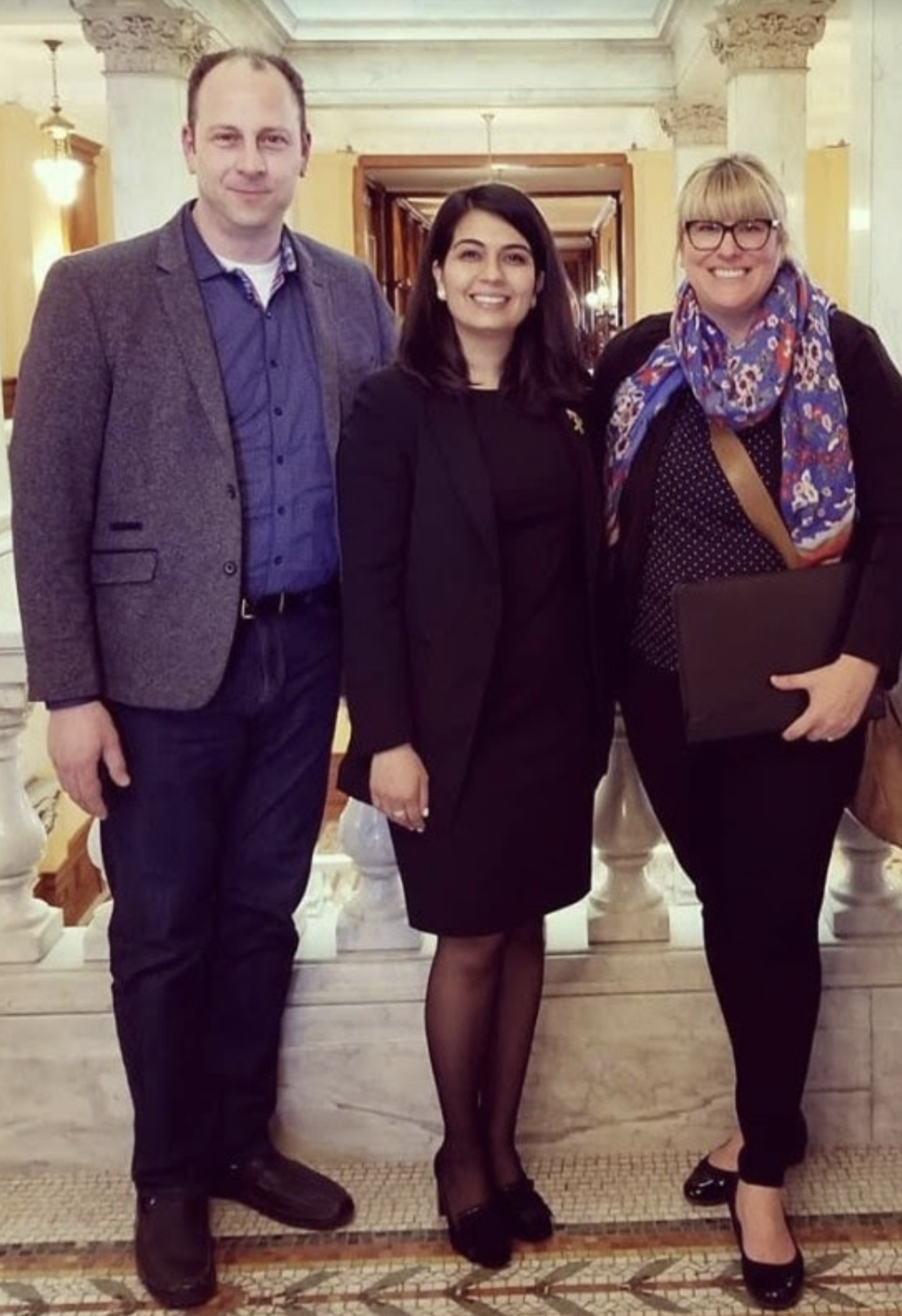Advocating for Children with Down Syndrome
Tuesday, March 23, 2021 /
Sarah Valiquette-Thompson (BA’15) has been a restaurant owner, a city councillor, and a private investigator – but advocating for people with disabilities is the role closest to her heart.
Pictured above: Sarah and Harvey visit a classroom. Before becoming a Down Syndrome advocate, Sarah was private investigator for several years. “I had so much fun – every file I got was a new adventure, but it could also be kind of dangerous. I got into some intense situations,” she says.
When she and her husband Ian were expecting Harvey, their second child, a prenatal screening test indicated that Harvey had Down Syndrome. What happened next sent the couple into a tailspin.
“I was referred to different specialists for echocardiograms, ultrasounds, and other tests,” Sarah says.
Many of the health care professionals they dealt with rattled off a long list of things their son wouldn’t be able to do, including feed himself.
“They questioned why we would want to continue with the pregnancy,” Sarah says. “They basically said our son would be a burden to us and his sister. We were scared because we didn’t know if he would have much of a life.”
It was only through internet searches about Down Syndrome, and by connecting with other families who’d had a prenatal Down Syndrome diagnosis, that they were able to begin sorting fact from fiction.
“We realized that it wasn’t just us who were being told these horrible things about our unborn child, it was happening across Canada,” Sarah says.
Talking to other parents also reassured them that their child could thrive.
“I can tell you that after three years of being Harvey’s mom, that three-quarters of the things on that list are very antiquated, and for us, we didn't experience most of them. He has been able to reach all his milestones and transition into daycare. Early intervention programs – speech therapy, occupational therapy, and physiotherapy – have been amazing.” 
Pictured right: In 2018, alumna Sarah Valiquette-Thompson formed a small passionate grassroots group that is pushing forward a private member’s bill in the Ontario legislature to give parents who receive a prenatal diagnosis of Down Syndrome more accurate information. Photo credit: Joanna Crichton
Sarah channeled the emotional devastation she went through into a mission to demolish harmful stereotypes and help families who receive a Down Syndrome diagnosis. “The information desperately needs to be updated so that it is the same and consistent – no matter where one lives in the province.”
Sometimes people with Down Syndrome are devalued as human beings,” she says. “My son hadn’t even drawn his first breath and he was being dismissed.”
She reached out to Ontario MPP Sara Singh whose sister, Gurvir, has Down Syndrome.
For the last year and a half, the two women and the Down syndrome Association of Ontario (DSAO), as well as many in the Down Syndrome community, collaborated to draft the first piece of legislation in Canada addressing how a prenatal diagnosis of Down Syndrome is delivered.
“MPP Singh introduced Harvey & Gurvir’s Law in November 2020, during Canadian Down Syndrome Awareness Week,” Sarah says. “It was a historic and very emotional day – I still get teary eyed when I watch the video announcement.”
The bill hasn’t received Royal Assent yet, but Sarah hopes it will be ratified by the summer of 2021.

Pictured left: DSAO Chair Domenic Gentilini, MPP Sara Singh, and Sarah at Queen’s Park:
Sarah watched Harvey and Gurvir’s Law, formally known as Bill 225, signed live. “Because of COVID, I couldn’t be there in person at the Ontario legislature, but MPP Singh and I held a press conference afterwards with the chair of the Down Syndrome Association of Ontario.”
If it passes, when parents are told that their child has Down Syndrome, they will also walk away with up-to-date ministry-approved information about the condition so that they can make the best decision about the pregnancy.
The bill will also enshrine a 48-hour waiting period (which parents can waive) after getting a diagnosis to give people time to process the news.
Sarah is now carrying on her advocacy work in Nova Scotia.
“I was supposed to go back to Lakehead Orillia in September 2020 but then COVID-19 hit, and everything fell apart – my son’s daycare closed and our restaurant in Washago really took a hit.
They decided to move to Nova Scotia because of its excellent supports for people with disabilities and because they have family connections there.
Sarah is now turning her attention to making her new province an even more inclusive one.
“It breaks you when someone you love is treated as if they’re not important,” she says.
Please click here to sign MPP Singh’s petition to support Harvey & Gurvir’s law and support their mission for inclusivity.

